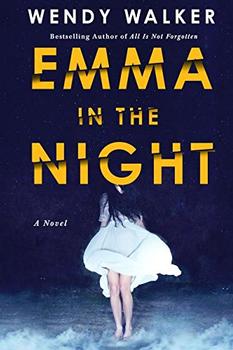Summary | Excerpt | Reading Guide | Reviews | Beyond the book | Read-Alikes | Genres & Themes | Author Bio

Three years ago, seventeen-year-old Emma Tanner left her shoes, purse and car by the beach and vanished. Without any sign of foul play, the incident might have been classified as a likely drowning. However on the same night, her younger sister, fifteen-year-old Cass disappeared as well leaving nothing but questions behind.
Now Cass is back, returning as suddenly and mysteriously as she left. As her parents and the FBI investigators gather, it's clear she has a story to tell. However, her recounting of that fateful night and what followed is only one small part of the tale. Woven around her narrated details of kidnapping, island captivity, and a daring escape is another story that readers need to parse. This is how we learn the sordid secrets of her family and the events leading to the night when everything changed.
This psychological thriller alternates between the points of view of Cass and Dr. Abby Walker, the forensic psychologist who covered the girls' case until she was forced to quit the investigation. Through her observations and studies, Walker knows this family well and is not fooled by the exterior the girls' mother has worked to perfect. She sees the dysfunction and in-fighting all too clearly.
Early on, it is clear that Cass may be an unreliable narrator. She's been through tremendous trauma and her puzzling story is full of unknowns. Cass claims she and Emma were held hostage on an island by a couple, Bill and Lucy Pratt, and she is desperate to help the investigators find her sister who couldn't escape along with her. However, Cass can't tell anyone where to find the island, and investigators cannot find records of a couple that fits her description.
For her part, Walker wonders why Cass ran to her mother's house when she returned. After all, Walker knows that the girls' mother is volatile and identifies the woman to be a narcissistic sociopath. Walker's own traumatic childhood has left her personally aware of the impact this specific mental illness has on families. Her understanding of the narcissistic mother-daughter relationship, and the emotions that might be buried beneath the facts, allows Walker to help Cass share her story.
Cass's personal tale of the events that led to the disappearance counterbalances Walker's more clinical explanation of narcissism. The girl's time away from home has allowed her the ability to see — and share — her family's history in a reflective, even objective manner. Cass's ability to calmly state the mental abuses she and Emma were subjected to creates a somewhat eerie tone.
Perhaps not surprisingly, I found Cass's narration the more compelling point of view. Her first-person account reveals the secrets in layers, bit by bit. Walker's side of the story adds a valuable explanation, especially for those readers interested in reaching a better understanding of mental illness and its impact on families, but the choice to tell her sections in third-person point of view feels like a misstep. With each shift in narration, I had to remind myself that Cass was no longer talking. This took me out of the story more than I would have liked.
The vignettes of Cass describing living with a cold, unfeeling mother, a checked-out father, and sleazy predatory stepbrother feel a little stereotypical of a wealthy family where impressions matter more than the truth. Although the incidents of fighting and verbal abuse are emotionally effective and disturbing, the family history does not offer many original plot points. The intrigue and mystery are more effectively wrapped up in the truths behind Cass's experience on the island.
Knowing that Cass is withholding information did not detract from my enjoyment of the story. As her tale becomes more complicated, revealing buried secrets, my interest increased, and kept me eager to discover what she was hiding — and why. I was not disappointed by the big reveal. The ending provides a satisfying conclusion, both emotionally and with regards to the plot.
Emma In the Night will appeal to readers looking for a voyeuristic peek into the lives of a wealthy, but extremely troubled family.
![]() This review was originally published in The BookBrowse Review in August 2017, and has been updated for the
August 2018 edition.
Click here to go to this issue.
This review was originally published in The BookBrowse Review in August 2017, and has been updated for the
August 2018 edition.
Click here to go to this issue.

If you liked Emma in the Night, try these:

by Julia Phillips
Published 2020
Spellbinding, moving - evoking a fascinating region on the other side of the world - this suspenseful and haunting story announces the debut of a profoundly gifted writer.

by Christopher J. Yates
Published 2018
The highly anticipated new novel from the author whose debut was called "The smart summer thriller you've been waiting for...The novel you should be reading tonight" (NPR's All Things Considered) and was named a Book of the Year by NPR and an Entertainment Weekly Must-List Pick.
Your guide toexceptional books
BookBrowse seeks out and recommends the best in contemporary fiction and nonfiction—books that not only engage and entertain but also deepen our understanding of ourselves and the world around us.